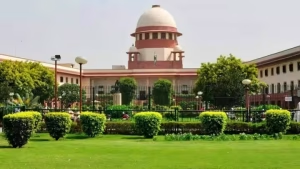
The date of the hearing is July 10.
Before a bench made up of Justices Sudhanshu Dhulia and Joymalya Bagchi, senior advocates Kapil Sibal, Dr. Abhishek Manu Singhvi, Gopal Sankaranarayanan, and Shadan Farasat brought up the issue and asked for an immediate listing.
Bihar Voter Verification Directive Faces Legal Challenge
Several prominent political and a civil society leaders have come together to challenge the Election Commission of India’s (ECI) recent directive mandating citizenship proof from large sections of voters in Bihar. Among the petitioners are Trinamool Congress MP Mahua Moitra, Rashtriya Janata Dal’s Manoj Jha, activist Yogendra Yadav, and the Association for Democratic Reforms (ADR).
Why the Directive is Controversial
The ECI’s June 24 order has drawn sharp criticism for being allegedly unconstitutional and impractical, especially given the size of Bihar’s electorate and the state’s socio-economic realities.
Senior advocate Abhishek Manu Singhvi argued,
“8 crore is the electorate and 4 crore have to do the enumeration. It is an impossible task.”
Representing the RJD, Kapil Sibal added that the burden being placed on voters to prove their citizenship violates core democratic principles. Advocate Sankaranarayanan noted a critical flaw in the process:
“They won’t accept Aadhaar card, voter card.”
ADR Calls the Directive Unconstitutional
The ADR was one of the first to file a Public Interest Litigation (PIL) seeking to strike down the ECI’s directive. They argue that it violates Articles 14, 19, 21, 325, and 326 of the Indian Constitution, which guarantee equality, freedom, personal liberty, and universal adult suffrage.
Moreover, the directive is said to be in direct contravention of the Representation of the People Act, 1950, and Rule 21A of the Registration of Electors Rules, 1960.
What the Petition States
The petitioners argue that the new requirement shifts the burden of proof from the State to the individual citizen, and excludes widely held documents such as Aadhaar and ration cards from being considered valid.
“The documentation requirements of the directive, lack of due process, as well as the unreasonably short timeline for the Special Intensive Revision (SIR) of Electoral Rolls in Bihar, will likely result in lakhs of genuine voters being disenfranchised,” the petition states.
Disenfranchisement Concerns in Bihar
Under the new guidelines, those not listed in the 2003 electoral roll must prove their citizenship. For applicants born after December 2004, not only their documents but also their parents’ citizenship proofs are required.
If a parent is from another country, the directive demands their passport and visa at the time of the applicant’s birth — a demand considered highly impractical in a state where birth registrations are often not available and documentation is limited.
ECI’s Defense of the Directive
In response to the backlash, the Election Commission has defended its decision, citing rapid urbanization and migration trends as justification for revising and verifying the electoral rolls to ensure accuracy.
Documents must be submitted by July 25, 2023,
and those failing to comply will still have a chance to present their case during the claims and objections period, which ends on September 1, 2025.